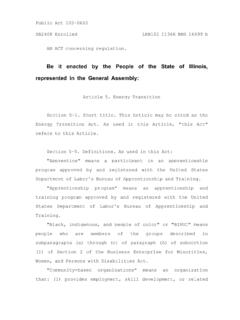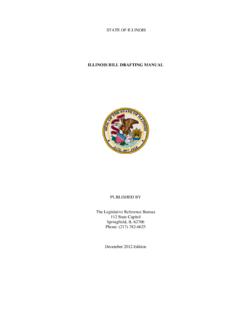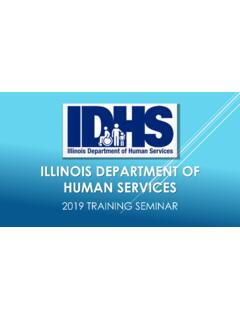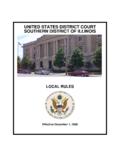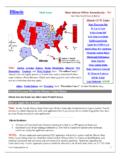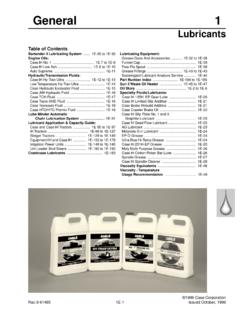Transcription of How Rules Are Made In Illinois - Illinois General Assembly
1 How Rules Are Made In Illinois What Happens During the rulemaking process ? When State agencies wish to adopt or change Rules that affect anyone outside the agency itself, they must follow certain rulemaking procedures outlined in the Illinois Administrative Procedure Act (IAPA) [5 ILCS 100]. The details of the process vary depending on the type of rule and the concerns raised by the affected public. Through the IAPA, the General Assembly delegates to executive branch State agencies authority to implement statutory law (Public Acts) via administrative law ( Rules /regulations).
2 For example, a statute may establish a grant program and place it under the authority of a State agency. The agency will then propose administrative Rules addressing details such as the application process and eligibility criteria. Under the IAPA, the Joint Committee on Administrative Rules exercises oversight of the rulemaking process on behalf of the entire General Assembly to insure that agency Rules meet the requirements of the IAPA and do not exceed the authority that the GA has granted to the agency in statute.
3 The IAPA also requires any agency that implements discretion in administering a program to include in its Rules the standards by which the agency shall exercise this power. If an agency is given, in statute, discretion to determine who shall receive a benefit ( , public assistance, a license or permit, a grant, a scholarship, a State contract) or a penalty ( , a fine, revocation of a license or permit, denial or termination of assistance), its Rules must clearly spell out the standards that the agency will use to make these determinations.
4 Types of Rules Four categories of rulemaking can be conducted by State agencies: Proposed Rules New Rules and rule amendments that must undergo public comment and JCAR. review prior to adoption. This process can take from 90 days to a year to complete. The vast majority of State agency Rules fall into this category. Emergency Rules Temporary Rules that take effect immediately or up to 10 days after filing with the Secretary of State, but remain in effect for no more than 150 days. The IAPA allows use of emergency rulemaking when an agency determines that a "threat to the public interest, safety or welfare" requires Rules to be adopted in less time than would be needed to complete proposed rulemaking .
5 JCAR reviews emergency Rules to insure that they meet these criteria. If an agency wants to maintain the policy established in the temporary emergency rule, a companion proposed rule must also be adopted. The companion proposed rulemaking should be adopted before the emergency rule expires. Agencies cannot file the same emergency rule more than once within a 24-month period, unless the General Assembly makes an exception to this limit and to the 150- day limit in statute. Statutes may also authorize agencies to use emergency rulemaking for specific purposes.
6 Peremptory Rules Rules implementing federal regulations, collective bargaining agreements or court orders; , measures that specify exactly how they must be enforced and do not allow the 1. agency any discretion. Peremptory Rules must be filed within 30 days after the action they implement and take effect immediately. They do not require public comment since they are dictated by an outside authority and cannot be changed. JCAR reviews peremptory Rules to insure that they meet IAPA criteria for this form of rulemaking .
7 Required/Internal Rules Rules that establish the organizational structure of an agency, set forth procedures for meetings, or establish procedures for responding to requests for information under the Freedom of Information Act. Most, but not all, of these Rules are contained in Title 2 of the Illinois Administrative Code. Internal Rules take effect immediately upon filing and do not require public comment or JCAR review prior to their adoption. How to Track rulemaking Activity Illinois Register All rulemakings are published in their entirety in the Illinois Register, a weekly publication of the Secretary of State.
8 The Register is published on Friday, or if Friday is a State holiday, on the next State business day. Generally, rulemakings appear in the Register 10 to 14 days after they are filed with the Secretary of State. Register issues are identified by a yearly volume number (from Vol. 1 in 1977 through the current Vol. 40 for 2016) and a weekly issue number (Issue 1 for the first issue of the year, Issue 52 or 53. for the final issue). Pages are numbered continuously throughout the year, beginning with page 1. in the first issue of the year and usually ending with 15,000 to 20,000 pages by the end of the year.
9 Citations for material that appear in the Register are by volume number and page number ( , 40. Ill. Reg. 1535). The most recent edition of the Register and electronic versions of all Register issues since October 2002 can be viewed on the Illinois General Assembly and the Secretary of State website (or at this link). SOS Indexes The Secretary of State's Index Department publishes weekly two indexes of rulemaking activity. The Cumulative Index lists, by Title, Part and Register issue and page number, all rulemaking activity that commenced in the current calendar year.
10 The Sections Affected Index lists all currently pending rulemaking activity, regardless of whether initiated during the current or the prior calendar year, by Section number and Register page number. Agencies Many agency websites post information about their recently proposed or adopted rulemakings. The Flinn Report Summaries of all rulemakings that appear in each week's Register can be found in The Flinn Report, JCAR's online newsletter ( Illinois General Assembly website Legislative Support Services JCAR Flinn Report).



